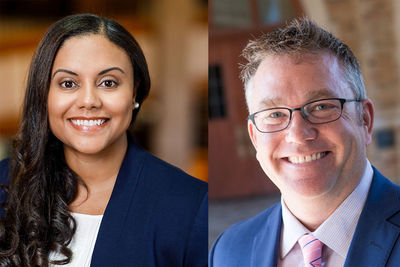New programs expand ND Law School’s interdisciplinary studies

Notre Dame Law School launched two new interdisciplinary research programs this month: the Program on Ethics, Compliance, & Inclusion, directed by Robert & Marion Short Scholar and Professor of Law Veronica Root Martinez, and the Program on Intellectual Property & Technology Law, led by John P. Murphy Foundation Professor of Law Mark McKenna.
The Program on Ethics, Compliance, & Inclusion is dedicated to analyzing incidents of organizational misconduct to identify its causes and develop proactive strategies for preventing future wrongdoing. Professor Martinez explained, “Law schools already do a very good job of training lawyers on how to respond when firms discover improper conduct within their ranks, but lawyers are often asked to advise clients on how to avoid such situations altogether. The research supported by the program will focus on helping organizations create and maintain more ethical, compliant, and inclusive workplaces.” To further that mission, the program will host academic roundtables and a new speaker series, all designed to help develop practical solutions to organizational misconduct and to support the work of attorneys and other individuals who organizations are relying on for help. The first roundtable has been scheduled for October 24-25 at Notre Dame Law in Chicago. Faculty Fellows of the program include Notre Dame Law Professors Roger P. Alford and Lloyd Hitoshi Mayer, as well as Ann Tenbrunsel, the David E. Gallo Professor of Business Ethics at Mendoza College of Business, and Kirsten Cornelson, an assistant professor in the Department of Economics.
Meanwhile, the Law School made a major investment in its rapidly growing intellectual property program with its new research Program on Intellectual Property & Technology Law, directed by Professor Mark McKenna. This interdisciplinary program promotes research on a broad range of topics related to innovation, creativity, technology, and entrepreneurship. Researchers affiliated with the Program study the laws and policies that promote innovation and creativity to serve the common good; the relationship between innovation and creativity-related policies and other values like free speech, competition, and distributive justice; and the legal and ethical implications of existing and emerging technologies.
Faculty Fellows from Notre Dame Law School include Professor Stephen Yelderman and Jodi Clifford, the director of the Notre Dame Intellectual Property and Entrepreneurship Clinic. “This new program will enhance our research profile and allow us to expand our intellectual property and technology law footprint,” McKenna notes. “Notre Dame’s global presence will enable us to fund research and organize conferences and other events around the world to bring together judges, practicing lawyers, and other policy makers and leading academics from a variety of disciplines.”
The addition of these new programs brings the Law School’s number of interdisciplinary research programs to seven. The other programs are: